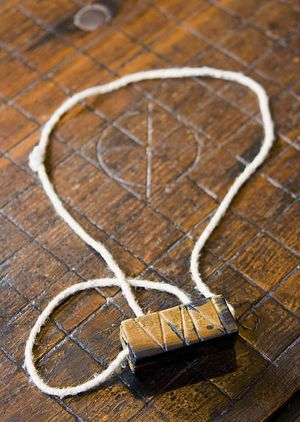Welsh Not
The Welsh Not or Welsh Note was a piece of wood, inscribed with the letters "WN", that was hung around the necks of children who spoke Welsh in some schools in the 19th century. The "not" was given to any child overheard speaking Welsh, who would pass it to a different child if overheard speaking Welsh. By the end of the day, the wearer of the "not" would be given a lashing. The idea of the "not" was to discourage pupils from speaking Welsh, at a time when English was considered by some to be the only suitable medium of instruction.
History
The use of the "not" was recorded in the 18th century; it was also commonly known as the 'custom, the 'Welsh stick' and the 'Welsh lead' (a lump of lead). The practice was mentioned in 1847 Reports of the commissioners of inquiry into the state of education in Wales. Though highly critical of many aspects of Welsh culture, some of the inspectors commented on the existence of the practice of using "nots" as being arbitrary and cruel. The report did not endorse the practice. Since education in this period was neither free nor compulsory it must be assumed that parents did endorse the practice where it was used. The reports also clearly show that the vast majority of education in Welsh Wales was still conducted in Welsh.
In the later decades of the 19th century, education was compulsory but the Welsh "not" was used only in a minority of schools, and after the school boards were absorbed by the county councils following the Local Government Act 1888, instruction in Welsh in elementary schools became the norm in Welsh-speaking areas. There is no evidence that the intermediate schools, in which instruction was almost universally in English, made use of the "not".
Similar policies in other countries
- Vergonha, French suppression of regional languages
- Dialect card Hōgenfuda (方言札, "dialect card"), suppression of Ryukyuan languages and dialects of the Tōhoku region in Japan [Note 1]
- Punishment of students who spoke their mother tongue in European grammar schools where only Latin was spoken
- More information is available at [ Wikipedia:Welsh_Not ]
Notes
- ↑ In Okinawa, the card was initially voluntarily adopted by Okinawan students at the start of the 20th century, but became mandatory as assimilation policies increased following 1917. A student who spoke Okinawan would be forced to wear the card, until another student also spoke in Okinawan, and then it would pass to the new transgressor, with the student wearing it at the end of the school day punished by the teachers
External links
Chat rooms • What links here • Copyright info • Contact information • Category:Root
